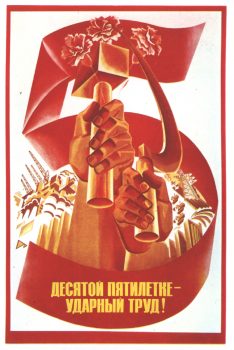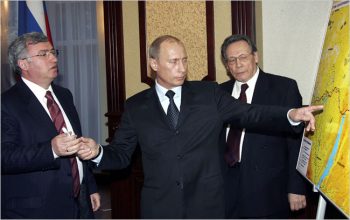20 Years of Attempting to Diversify the Russian Economy – Part III Posted by Nadya on Jun 18, 2020 in History
“It is clear that in the long run, oil will reach prices that balance demand and consumption, and demand will increase after quarantines are canceled due to coronavirus.” Mikhail Khodorkovsky’s1Russian opposition politician and former owner of the Yukos oil company Interview to the channel TV-2 April 21, 2020
We continue (see the previous post) to talk about the history of Russian oil. Today we will see whether the country’s leadership learned from this.
The postwar years
In the postwar years (послевое́нные го́ды), the Russian oil industry developed rapidly due to the discovery of a significant number of new oil fields and widespread use of the latest advanced technologies. Since 1928, the RSFSR followed the series of five-year plans which began under the rule of Joseph Stalin2A Soviet revolutionary and politician, the Soviet Union leader from the mid-1920s until 1953.. Those plans included an improvement (улучше́ние) in the oil production. Overall, the period should be considered successful. The industry resumed its operations, which were modernized (модернизи́рованы); infrastructure (инфраструкту́ра) for the further development of its pipeline network was ready; prewar oil production level exceeded expectations. In 1956, more targets were set for the USSR oil industry. Directives called for a 91% increase over five years. Stalin’s goal was outreached by almost 150%.
The Era of Stagnation
Over the next twenty years, the Soviet Union was increasing its share of global oil production. In 1965, it was second only to the USA. The 1970s were a pretty stable period of development. Soviet oil workers got financing and technology; the industry did not have disruptions and produced oil in large volumes. However, the dependence on mineral exports has led to what we can now see as inevitable results.
By the mid-1970s, non-resource (несырьево́й) sectors of the economy were not evolving enough. In 1980, Soviet oil production was 9.8% higher than US output. Period in the Soviet history
between 1964 and 1986 is called the Era of Stagnation (Пери́од засто́я)3Approximately between 1964 to 1986. Proponents of this theory connect the stability (стаби́льность) of the economy of that time with the oil boom of the 1970s. They considered that the Government firmly believed that the primary source of the budget had no limits of growth. The country’s leadership did not have any incentives to modernize the economic and other social sectors.
In the mid-1980s, a fall in oil prices prompted the Government to recognize the need for economic reform (экономи́ческая рефо́рма). The lack of a well-thought-out foreign financial strategy resulted in severe losses (поте́ри). A decisive renunciation of the old Marxist constructs4marxism’s objective of developing a positive (empirical) science of capitalist society as part of the mobilization of a revolutionary working class. was a necessary step. There were no ready-made tactics, so the attempts to restore the industry were made by trial and error.
Dashing Nineties
The 1990s in Russia were a wild, lawless (беззако́нный), and out-of-control (вне́ контро́ля) time. Economic and social destabilization (дестабилиза́ция), chaos (ха́ос), and the street rules dominated everywhere. On the evening of December 25, 1991, the red flag was lowered from the Kremlin‘s flagpole. The Soviet Union ended its existence and reconstituted itself as the Russian Federation. A new project of transforming Russian oil enterprises according to a Western model was announced. The entire production chain from the well to the gas station (запра́вка) was supposed to be at the same location. Such famous companies as Rosneft, YUKOS, LUKOIL, Transneft, and other firms were created. But export was constantly declining. The ruling elite kept it for political, not commercial reasons. The oil industry became dangerous for workers; it was a scene of bloody hassles, often fatal. Russian law enforcement was too weak and corrupt, which is why such situations were rarely resolved. The fall in oil prices in 1998 led to another financial crisis in Russia. December 31, 1999, President Boris Yeltsin announced his resignation. Putin took the position in his chair.
The Beginning of The New Millennium
Specific relations between businesses and government agencies emerged. Russia ranked third in the world in terms of oil production in 2000.
In 2001 and 2004, President Putin officially noted that Russia’s primary income was coming from the oil sector. In 2006, he announced that the main task (основна́я зада́ча) of the Government was to diversify the economy. He called it “The super goal for the coming decade”. According to the statistics (стати́стика), net exports of oil and petroleum products were over 70% of oil production in 2007. Oil prices were on the rise; GDP steadily grew; the country’s budget increased at an impressive pace. The global financial crisis of 2008 did not do much harm to the oil industry. Putin twice repeated how it was crucial for Russia to get rid of oil export dependency. In 2009, almost half of exports in monetary (де́нежный) terms belonged to this sector.
Demand on crude oil and its goods continued to increase. At the end of 2013, Russia regained the honorable third place in the world in oil production after the United States and Saudi Arabia. Soon after, Putin reiterated the need for economic diversification. From that time until the spring of 2020, Putin spoke four more times about the path of modernization and diversification of the Russian economy. He emphasized the importance of more energetic action in this direction despite the growing pace of the export of natural resources.
Today
The statistics of oil products exports stubbornly shows an up arrow during the entire period of Vladimir Putin’s presidency. Only in a short period during world crises, the line was pointed down on the crude oil export graph (гра́фик). Based on these data and historical facts (истори́ческие фа́кты), it is hard to say that today Russia is ready to free itself from oil dependence. Russia increased oil production and export in early 2020. The Asian oil market during the pandemic became more profitable (рента́бельный) than the European one. However, according to analysts (анали́тики), uncertainty in the oil market will continue over the next five years.
https://www.youtube.com/watch?v=E8f4Kw2o4F8
- 1Russian opposition politician and former owner of the Yukos oil company
- 2A Soviet revolutionary and politician, the Soviet Union leader from the mid-1920s until 1953.
- 3Approximately between 1964 to 1986
- 4marxism’s objective of developing a positive (empirical) science of capitalist society as part of the mobilization of a revolutionary working class.

Build vocabulary, practice pronunciation, and more with Transparent Language Online. Available anytime, anywhere, on any device.






